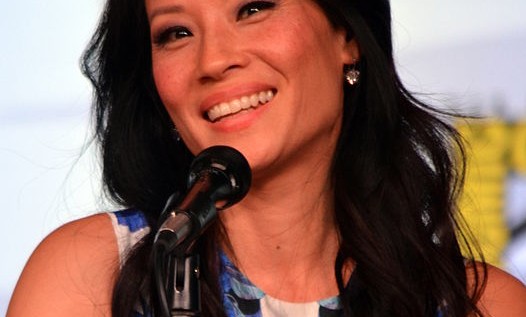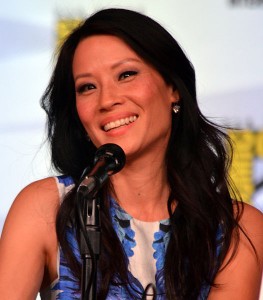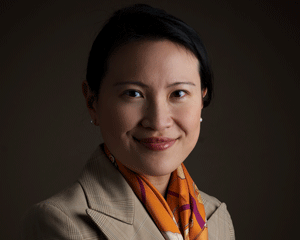Why we need more Lucy Lius on TV

 I am a crime show fan, but I am lukewarm to Jonny Lee Miller’s Sherlock Holmes (Elementary) on CBS. (I much prefer Benedict Cumberbatch’s Sherlock on BBC.) One reason why I watch Elementary is Lucy Liu’s Dr. Watson. She is a refreshing contrast to Miller’s over-the-top, high-strung performance. More importantly, she plays a strong, smart, Asian woman who is also warm, collaborative, and emotionally intelligent. In last week’s episode, she pointed out to Holmes that he might perhaps be more successful if he had the support of his colleagues.
I am a crime show fan, but I am lukewarm to Jonny Lee Miller’s Sherlock Holmes (Elementary) on CBS. (I much prefer Benedict Cumberbatch’s Sherlock on BBC.) One reason why I watch Elementary is Lucy Liu’s Dr. Watson. She is a refreshing contrast to Miller’s over-the-top, high-strung performance. More importantly, she plays a strong, smart, Asian woman who is also warm, collaborative, and emotionally intelligent. In last week’s episode, she pointed out to Holmes that he might perhaps be more successful if he had the support of his colleagues.
There was also an episode in which she came to terms with her own abandoned career as a surgeon. I know many Asian American friends who could relate to the feeling of having “disappointed” a parent because they had not lived up to their “potential”. The potential that Watson’s mother ascribed to her. Bringing this into the story line subtly reminds viewers of the “minority stereotype” that the US media likes to ascribe to the Asian American community.
Yet, in my group of friends, the name ‘Lucy Liu’ provokes fierce discussion. As one of the more prominent Chinese-American actors in Hollywood now, Liu first burst onto the national scene in the form of “Ling Woo”, a hyper-competitive, self-centered, sexy, and manipulative lawyer in the television series, Ally McBeal. Many of us may still unfairly associate Lucy Liu with that character.
THE STEREOTYPE
Woo embodied a type of Asian female that was many American women’s worst nightmare – sexually predative, thin, smart, and incredibly competitive. Thankfully, she dug her claws into Richard Fish, the grown-up equivalent of a pimple-faced virgin teenager, and not the attractive male protagonist, Billy Thomas. Frankly, I thought Woo was way out of Fish’s league, but hey, this is just TV, right?
Fortunately, Lucy Liu’s career has come a long way from the Woo character, which brought to life an unfair Asian American female stereotype. In the last 11 years since, Liu has played diverse characters, from Alex in Charlie’s Angels, to an assassin in Kill Bill.
However, on TV these days, the stereotype of a hyper-competitive, overly driven / hardworking, emotionally distant Asian American female persists. From Susan Oh’s Cristina Yang on Grey’s Anatomy to Gong Li’s Isabella in the movie, Miami Vice, to the real-life ex-Mrs. Rupert Murdoch, Wendi Deng, and this season’s Top Chef contestant, Shirley Chung, the media seems to love it when these “dragon ladies” bare their claws.
Even in movies where Chinese investors had a big influence over plot elements of the movie, such as Looper, the Asian characters had no lines, and were mere backdrops to the main plotline. Here’s a crazy thought – if Hollywood wants more moviegoers in China to see its movies, how about toning down the stereotypes and racism towards Chinese people? I don’t know about you, but it doesn’t make me feel good when the only people I see on screen who look like me are either villains or wordless sexual objects. See this article for an analysis of recent racism on TV towards Chinese people.
THE REALITY
This is unfortunate and unfair to the diversity of personalities within the Asian American women community. How diverse are women within this community? According to the US Census 2010, the Asian Americans community represent over 30 countries and ethnic groups that speak over 100 different languages. 50% have a college degree or higher. 37.8% of Hmong Americans live below the poverty line. That number is 29.3% in the Cambodian community, 18.5% in the Laotian community, and 16.6% in the Vietnamese community – compared to the national rate of 12.4%.
THE FUTURE
At the end of the day, we not only need more Lucy Liu’s on TV, we need more Olivia Munn’s (Newsroom), Keiko Agena’s (Gilmore Girls), Michelle Yeoh’s (Tomorrow Never Dies) and Mindy Kaling’s (The Mindy Project). Women who represent more fully the strengths, weaknesses, fears, and hopes of real Asian American women in this country. Hollywood, these people exist. Why not put them on screen as real characters instead of caricatures?
One of my favorite lines is from the movie, Looper, in a scene where time-traveling hitman Bruce Willis offers some advice to his younger self (Joseph Gordon-Levitt), “You should go to China.” When Gordon-Levitt responds that he is going to France, Willis insists, “I’m from the future. You should go to China.” Of course, this line was put in for the Chinese investors’ sake. But still…
Hollywood, are you listening?





